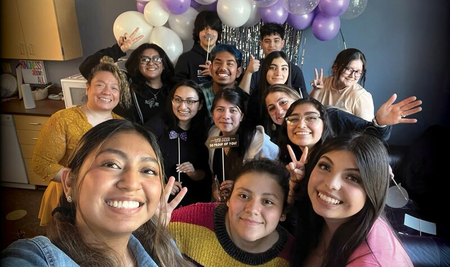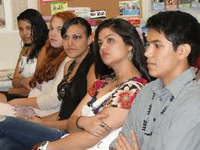
The mark of a mentor
By Elisabeth Schnebele
Students in the Latino Leadership Initiative don’t just change their own lives. They also inspire local Latino high school students.
Often, education is taken for granted. It’s not unusual for children and teenagers alike to dread going to class or doing their homework. Some have parents who reinforce the importance of going to school, but not all can or do, depending on their life circumstances.
This discrepancy is particularly evident when looking at U.S. Census percentages of different populations who have college degrees. Among major ethnic groups, Latinx appear to have the weakest rates, with only 33% percent of adults having at least a bachelor’s degree.
“In our Latinx, Hispanic community, I feel like a lot of parents don’t necessarily pay attention to us kids,” said Maria Valentina Palacios, a 2022 University of Washington Bothell alumna who majored in Law, Economics & Public Policy and minored in Human Rights. “It’s not because they don’t want to or don’t care. It is because they are so busy working trying to provide for their family. Many are immigrants and don’t necessarily know how to help or, like I said, have the time to help — and so the kids get overwhelmed and want to drop out.”
Latinos have the highest dropout rate as well as low participation in civic, political and community activities, confirmed Victoria Breckwich Vasquez, affiliate assistant professor and lecturer in UW Bothell’s School of Nursing & Health Studies. “There are many reasons as to why this occurs — lack of role models or mentors, weak organizations and cultural barriers — but an important one is the need for more Latino leaders at all levels.”
The Latino Education & Training Institute, based in Lynnwood, Washington, is working to help people overcome these obstacles — with the assistance of UW Bothell students.
Expanding leadership
LETI was founded by Rosario Reyes, a first-generation immigrant from Peru, as a response to the lack of information and resources available to Latino immigrants. Its mission is to facilitate the personal and financial success of Spanish-speaking Latino immigrants and low-income individuals so they can pursue their dreams and can become leaders in their communities.
In 2013, LETI brought together community leaders and supporters to discuss how they could create a program to energize the Latino community and expand its leadership base in the Greater Seattle area. Representatives from several Puget Sound agencies and organizations joined the effort, and, after multiple brainstorming meetings, the group approved the development of a leadership curriculum for college and university students known as the Latino Leadership Initiative.
UW Bothell joined the LLI as a participating college four years ago, with Vasquez serving as the program supervisor. “It felt that oftentimes Latinx people didn’t have a strong foundation in having enough resources to help their communities,” Vasquez said. “So much of their experience — mine included — is constantly struggling to put their best foot forward and to find resources that they can use for their own professional development.
“This program is an effort to allow students to gain leadership skills and get access to resources and communal support so that they are then able to identify their needs, the needs of their communities and, most importantly, the capability to address those needs.”
At the heart of LLI is mentorship. Once a month, students from all participating colleges come together to meet and network with prominent Latinx dignitaries and professionals.
Shared experiences
“We have had community and civic leaders, politicians, teachers, health care leaders, musicians and artists,” Vasquez said, “People all over the map who come in and speak about how they see leadership in their own lives. And all of them are Latinx identified. So it really is an examination of being able to bring all of that talent to the room.
“For many of these students, they’ve never met people in these positions who are of the same culture, because it’s relatively rare. Seeing these people in person opens up the possibility of what is possible.”
The UW Bothell students aren’t just mentees. Over the course of the two-quarter program, they transition into the role of mentors for local Latinx high school students. “At the crux of the program is civic engagement, as the LLI students participate in a 40-hour internship service-learning project,” Vasquez explained. “The past three years we have partnered with Bothell High School as they have about 14% Latinx students, which is the highest population in the Northshore School District.”
Palacios participated in the program in 2022. Having immigrated to the United States her junior year of high school, she used her experience to relate to and better support these current high school students. “I knew what they were lacking, because I experienced it firsthand,” she said. “When I first started, I didn’t even speak English but was just thrust into classes. But it wasn’t just a new language, it was a new culture, a new everything.”
Above all else, Palacios remembers feeling lost.
“It was the most important year. I had to take the SAT and the ACT. I had to apply for colleges. My parents had never done any of this before either as they just moved to the U.S., too,” she said. “It was really hard and scary.”
Graduation dreams
Wanting to prevent the Latinx Bothell High School students from experiencing all these hardships, Palacio helped the juniors and seniors with their college applications and helped the first-year students and sophomores figure out which classes to enroll in, depending on their interests and goals.
The impact this made on their future was astronomical. “I worked with one student who was seriously considering dropping out of high school,” Palacios said. “I worked with one student who was seriously considering dropping out of high school. He felt really lost, like I did when I was that age. He also felt like his parents didn’t care about him. He didn’t really have anyone to talk to or anyone to listen, so that’s what I did.
“I asked him about his interests, what he liked and what he wanted to do in the future,” she said. “I met with him every week, and he started skipping classes less and less. Now he is about to graduate with his GED.”
Felicity Abeyta, a pre-major academic adviser in UW Bothell’s Student Success Center, has been able to bear witness to the growth and change students undergo while in the program. “These students are trailblazers — both the high-schoolers and the college students,” she said. “It is a beautiful system of generational mentoring where everyone’s experiences and knowledge are benefiting each other.
“Professor Vasquez passes it on to the UW Bothell students who pass it on to the high school students and so on and so forth,” Abeyta said. “It’s a wonderful, community-based format that impacts dozens of students.”
I worked with one student who was seriously considering dropping out of high school. He felt really lost, like I did when I was that age. He also felt like his parents didn’t care about him. He didn’t really have anyone to talk to or anyone to listen, so that’s what I did. I asked him about his interests, what he liked and what he wanted to do in the future. I met with him every week, and he started skipping classes less and less. Now he is about to graduate with his GED.
Maria Valentina Palacios, UW Bothell ’22
Trailblazer impacts
Abeyta said she also feels a personal connection to the program as a Bothell High School graduate and as a UW Bothell alumna (Society, Ethics & Human Behavior ’03) whose mother was a migrant farmworker. Abeyta was proud of her family but felt isolated from her identity and ran away from home at just 14 years old.
“Growing up, I really struggled finding community and people who looked like me. Being an adviser and participating in this program brings me a lot of joy because I can prevent students from experiencing a lot of the things that I went through and can help them develop strong pathways into their dreams,” she said.
“The LLI program achieves my whole dream of helping students — not just of getting them to economic stability but to where they have the foundation that empowers them to go on and be multicultural leaders in their communities and organizations. And then this mentorship and leadership development will come back to the UW Bothell community.
“I highly encourage students to apply for the program,” Abeyta said. “It won’t just change your life. It will change your community.”
(This article first appeared Aug 9, 2023 in the Newsletter of UW Bothell.)





